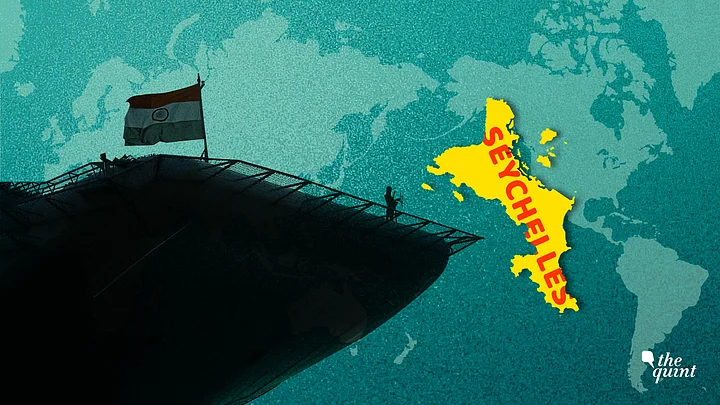When PM Modi visited Seychelles in March 2015, New Delhi and Victoria had agreed to develop a military facility in the Assumption Island. India’s planned investment of USD 550 million included the development of an airstrip, jetty, and housing infrastructure for the Seychelles Coast Guard.
The joint project intended to enhance Seychelles’ ability to undertake surveillance and effective patrolling in its 1.3 million square kilometre Exclusive Economic Zone (EEZ). Additionally, Assumption Island was set to offer New Delhi a strategic footprint in the Indian Ocean Region (IOR), specifically, in the southern Indian Ocean.
Re-Emergence of the Indian Ocean
On 4 June, Seychelles President Danny Faure stated that the agreement with India would “not move forward.” He added that the issue will not feature on the agenda of the upcoming meeting between Faure and PM Modi, scheduled for late June. The government of Seychelles has not officially informed the Indian government about its decision to cancel the deal.
Notably, President Faure reiterated the need to have a military post in the Assumption Island and revealed plans to earmark budget for a Coast Guard facility.
Too busy to read? Listen to the story instead.
In recent years, the Indian Ocean has become increasingly contested. Given the strategic flux in the global world order, the region has become the cynosure of multiple regional and extra-regional powers. China’s foray in the IOR and its intense attempts to court small IOR littoral countries such as Sri Lanka and Maldives is conspicuous. Other instances of growing interests include:
- the rechristening of the United States Pacific Command (USPACOM) as the United States Indo-Pacific Command (USINDOPACOM),
- France’s renewed engagement and naval movements in the region
As a resident power in the Indian Ocean, New Delhi has traditionally enjoyed a degree of leverage. However, as the waters are getting more contested, India is attempting to strengthen its position and reach beyond its traditional waters.
Indian Ambitions
India’s conceptions of its security role in the IOR have evolved within the last two decades. Claiming to be a ‘benign’ maritime power in the early 1990s, New Delhi now officially asserts its role as a ‘provider of net security’ in the IOR. In order to operationalise its role and consolidate its position, India has sought to strengthen its security cooperation with IOR littorals.
Seychelles plays a crucial role in this regard. India and Seychelles share similar strategic interests in the region and have had a robust defence equation following the military cooperation agreement in 2003.
An overseas base in Seychelles would help India have a stronghold in the region and monitor Chinese activities, and secure its oceanic trade.
Domestic Contestation
Even though the heads of India and Seychelles had agreed (in principle) to the deal in 2015, it required ratification by the Seychelles Parliament. However, in the last three years, progress has been excruciatingly slow and plagued by a number of setbacks. Changes in the institutional heads (foreign secretary and principal secretary in Seychelles) have slowed progress further.
One of the major retardation factors has been the domestic contestation over the deal.
The biggest setback was in March when the text of the Detailed Project Report (DPR) were leaked on YouTube, sparking a controversy and questions over the nature of the deal. In order to alleviate domestic political fears and claims that the Island has been ‘sold off’ to India, the deal was revised. The revised deal included clarifications about the non-use of the facility for war purposes, and allowing a third party after reaching a consensus.
Nonetheless, protests over the deal continue from different quarters such as environmental activists who have questioned the impact of the military infrastructure despite reassurances about no adverse impact.
Even the opposition party reneged on its support to the agreement. Some domestic concerns include the possibility of getting involved in an India-China regional competition.
The French Connection
Given France’s historical footholds and an influential diaspora, Seychelles can well become a pivotal node of India-France maritime cooperation in the IOR. Paris has renewed its security cooperation with Seychelles.
It has offered support in capability building and managing maritime security threats, personnel training, and enhancing Seychelles’ Maritime Domain Awareness (MDA) in the EEZ. India and France have common interests in the region and have in recent years stepped up joint activities in the maritime domain.
In fact, India and France recently held their fourth maritime dialogue in Paris at the Deputy NSA level. Both countries can pool together their resources towards fulfillment of shared vision and strengthening Seychelles’ maritime infrastructure capacities.
Keeping the emerging importance of the IOR in context, it is hoped that the current developments in Seychelles are mere ripples which do not overshadow the momentum of cooperation and pursuit of freedom of navigation and a rules-based order.
(The author is a PhD Candidate at the Graduate School of Politics (GraSP), University of Münster, Germany. Her doctoral thesis concentrates on the evolution of India’s security role in Southeast and East Asia. She can be reached at @aditi_malhotra_. This is an opinion piece and the views expressed above are the author’s own. The Quint neither endorses nor is responsible for them.)
(At The Quint, we question everything. Play an active role in shaping our journalism by becoming a member today.)
